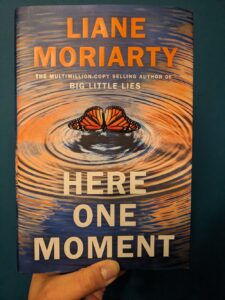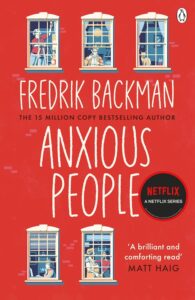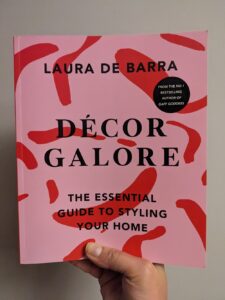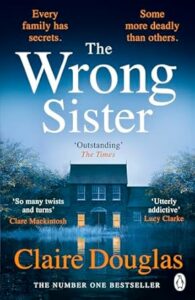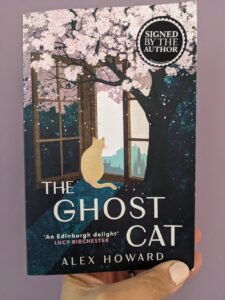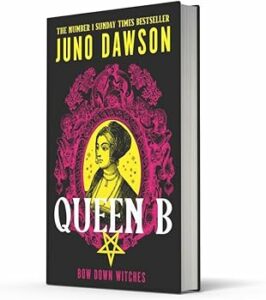Here One Moment by Liane Moriarty
Written by Ashley Kelmore, Posted in Reviews
Best for:
Fans of her previous work. Fans of books that follow multiple peoples’ perspectives. People who enjoyed ‘The Measure.’
In a nutshell:
On a delayed flight between Hobart and Sydney, Australia, a woman name Cherry walks up the aisle saying ‘I expect’ followed by an age at death and a cause of death for nearly ever person on the plane. Within a month or so, three of her ‘predictions’ turn out to be correct. So the question is – who is Cherry, what does she actually know, and is she right about everyone?
Worth quoting:
“Once you reach a certain age you come to accept strange behaviour from young people. They either look straight through you as if you’re a pot plant, or they treat you like you’re made of glass, hands hovering in case you tumble.”
“They just thought that if you worked hard most days then you could afford the kind of stuff that everyone else had. They have messed up big time.”
“When you live with someone who dislikes you in a mostly unspecified way, you begin to dislike yourself too.”
Why I chose it:
I love all of her books. I didn’t know a new one was coming out until I saw it mentioned online somewhere, and I immediately ordered it. Hardback, so you know I’m serious.
Review:
There are a few storylines going on in this book. There’s Cherry’s story, which jumps around a bit, but mostly starts now, with her in her 70s or 80s, and then goes back to her childhood, and is told in the first person from her perspective. And then there are the stories of a few people from the plane, told from a narrator’s perspective. There is Paula, who was told her baby son would die at age 7 from drowning; Eve, who was told she’d die by intimate partner violence at age 25 (bonus: the flight is for her honeymoon). There’s Leo, who will be dying soon from a workplace incident, and Ethan, who will also be dying soon, in an assault. Allegra, a flight attendant who is meant to die by self harm in the next year. And of course Sue, who has a few years before pancreatic cancer takes her.
The people on the flight mostly ignore the woman once they get off the plane. Then, a few weeks later, a teen from the flight, who was told age 19, car accident, dies during a live stream of her driving, very cautiously, at age 19. Then two elderly people who were to die soon of old age do die. So the folks on the flight begin to wonder – is this their destiny? For those with predictions in the next year or so, should they do whatever they can to avoid it? Should Leo quit his job until his next birthday passes? And who is Cherry? Does she have some sort of power of prediction? What’s her story? Where has she come from?
Moriarty is fantastic at developing characters even though they don’t take up the whole of the book. I feel like I know all of the main folks in the book, and understand where they come from with their thinking. Can they change their own destinies? If not, what do they want to be doing with the life that remains?
What’s next for this book:
Keep – I may read it again, or at least loan it out to people.
